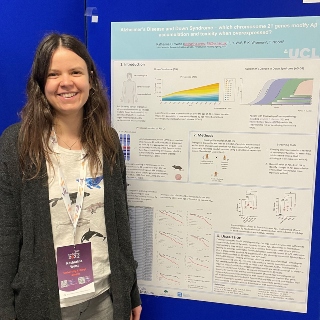How to Help the Institute of Healthy Ageing V2
WHAT WE DO
The Institute of Healthy Ageing is unique in the UK in trying to understand the fundamental cellular mechanisms driving ageing and late life frailty and disease.
The human population is living longer and longer, thanks to advances in sanitation and medicine, many now live to see their great-grandchildren. However, the increase in lifespan also means most people today will eventually suffer from an age associated disease. These are diseases linked to old age: cancer, cardiovascular disease, dementias and Parkinson’s’ are some of the most common.


GENETICS
Our physical and biological traits are determined by our genes. These genes are tightly packed into structures called chromosomes of which each human cell contains 23 exact pairs. However, in some rare cases, a child is born with an extra or a missing portion of a chromosome, leading to so called chromosomal abnormalities.
The most common of these is found in people who have Down Syndrome. These individuals carry three rather than the usual two copies of chromosome 21, this means they will have 3 rather than 2 copies of genes found on that chromosome. In the womb, this already leads to some altered development. Aside of some physical features including a more flattened face and almond shaped eyes, having an extra copy of chromosome 21 means people with Down Syndrome experience some degree of intellectual disability.
Their brain is also affected differently during the ageing process compared with the general population. Having Down Syndrome puts people at increased risk of developing early onset Alzheimer’s disease with around three-quarters over the age of 65 showing clinical symptoms of memory loss.
While the birth rate of babies with Down Syndrome has remained relatively steady over the last few decades, individuals born with this condition now live much longer than they did just 20 years ago due to improved medical and social care. This means that in this population the number of Alzheimer’s disease is rapidly increasing and is now the leading cause of death in people with Down Syndrome over the age of 35.
There is currently no cure for any form of dementia including Alzheimer’s disease which underlines the importance of research in this area. To complement clinical studies involving patients, model organisms play a crucial role in advancing our understanding of how Alzheimer’s disease develops and progresses.
IN OUR LABS
One of the lesser-known model organisms, the fruit fly (Drosophila melanogaster), provides a unique opportunity to study how having an extra copy of genes on chromosome 21 may affect Alzheimer’s disease development. This is because unlike mammals that are most commonly used in research of Down Syndrome and Alzheimer’s disease, flies have a much shorter lifespan and can be cheaply bred in large numbers. Additionally, despite the significant evolutionary distance between flies and humans, fruit flies carry comparable copies to 75% of genes that have been implicated in human diseases. They also have a well-defined brain with similar cells to a human brain.
In our lab we are using the fruit fly to study how having increased amounts of genes found on the human chromosome 21 might affects the Alzheimer’s disease in patients. To do this we use a fly model of Alzheimer’s disease that accumulates in its brain the protein that is thought to cause Alzheimer’s. These flies are sick and live less than wild type flies.
We are able to increase, in turn, the levels of each gene that has additional copy copieseople with Down Syndrome, we can then assess whether having more of that particular gene is enough to worsen Alzheimer’s disease. The speed of fly experiments and the low cost allows us to look at a large number of genes, if we discover something interesting, we can validate our findings in human brain samples.
Ultimately understanding which genes may be causal in the development and progression of Alzheimer’s disease in people with Down Syndrome and the mechanisms through which this happens will allow for the development of treatments that could one day provide a cure for dementia both for people who carry an extra copy of chromosome 21 and others who are diagnosed with Alzheimer’s disease.
 Close
Close



